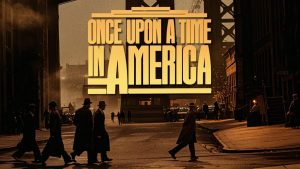Once Upon a Time in America (1984) is an epic crime drama directed by Sergio Leone that tells the haunting story of friendship, betrayal, and lost dreams within the violent world of organized crime. Spanning several decades, the film follows David “Noodles” Aaronson (played by Robert De Niro) and his childhood friends as they rise from street kids in a Jewish neighborhood in New York City to powerful gangsters during the Prohibition era. The story is told through a series of flashbacks and memories, creating a nonlinear narrative that reflects the fractured nature of Noodles’ past and his regrets.

At its heart, Once Upon a Time in America is about the passage of time and the cost of ambition. Noodles’ complicated relationship with his best friend and partner in crime, Max (James Woods), is central to the film. Their bond is tested by conflicting desires, betrayal, and the dangerous allure of power. Leone explores how choices made in the past resonate far into the future, showing how the weight of guilt and lost innocence haunts Noodles. The character’s journey is filled with morally complex decisions, and De Niro’s performance captures the internal conflict of a man unable to escape his own history.

The film’s visual style is richly atmospheric, capturing the gritty streets of early 20th-century New York and the opulent, shadowy world of gangsters. With grand cinematography, intricate set designs, and Ennio Morricone’s haunting score, Leone builds a world that feels both nostalgic and tragic. The film’s iconic scenes—whether in smoky speakeasies, tense confrontations, or dreamlike moments of reflection—are imbued with a poetic quality that elevates the story beyond the typical crime drama.

Once Upon a Time in America is more than a gangster movie; it’s a meditation on the choices that define our lives and the memories that remain. Leone’s final film explores the themes of love, betrayal, and the elusiveness of the American Dream, leaving audiences with a sense of melancholy and reflection. Its layered storytelling and unforgettable characters make it one of the most ambitious and poignant films in the genre, cementing its place as a masterpiece in cinematic history.